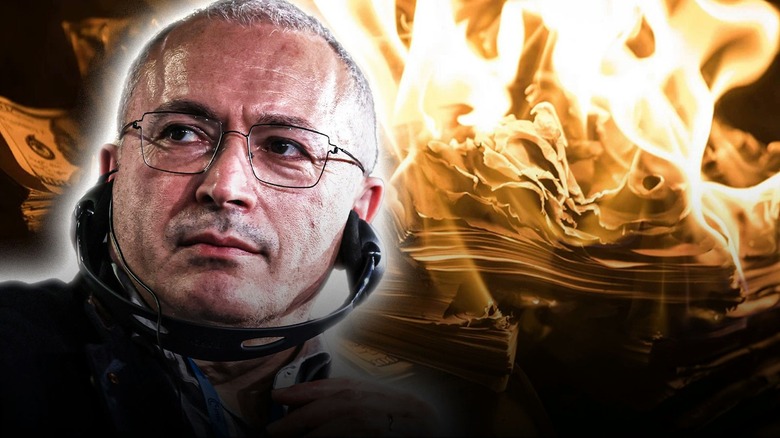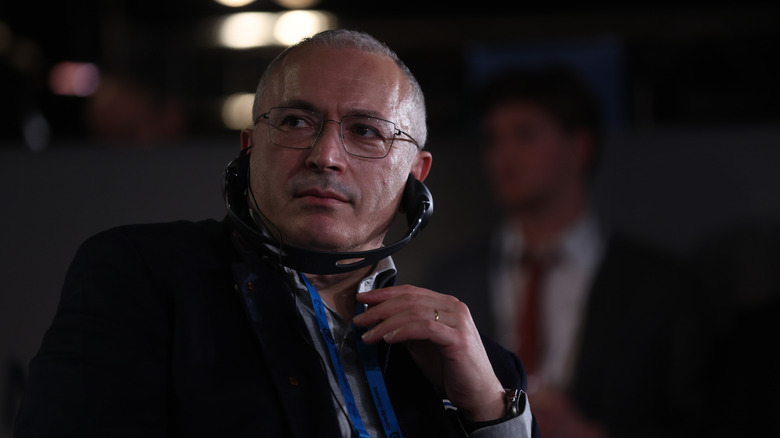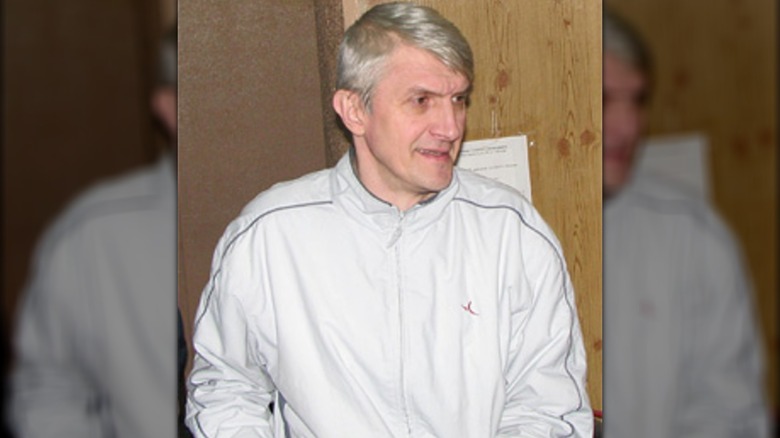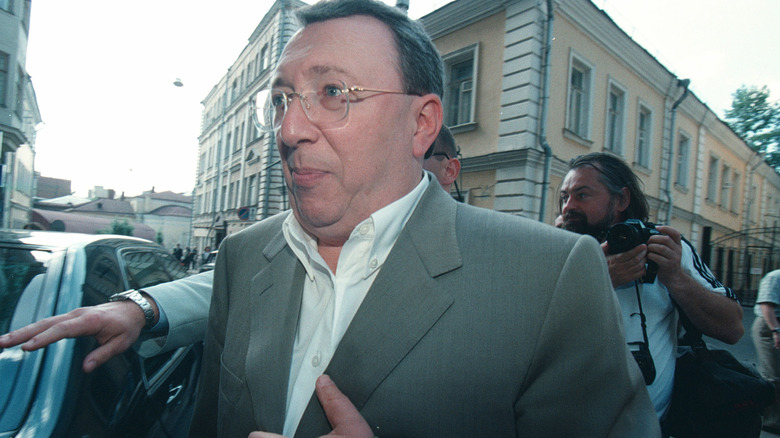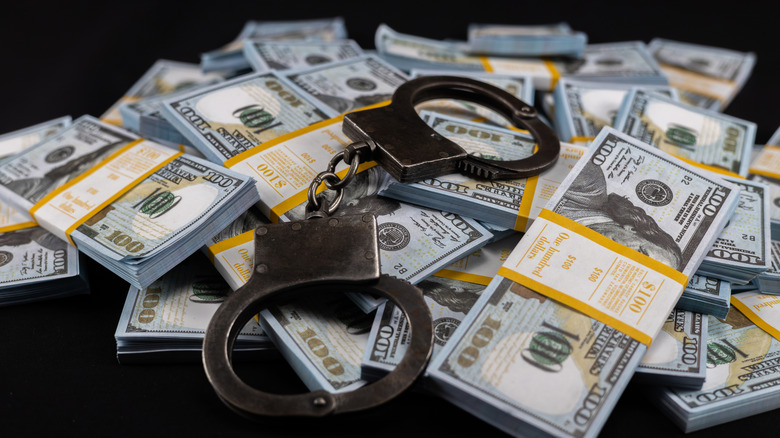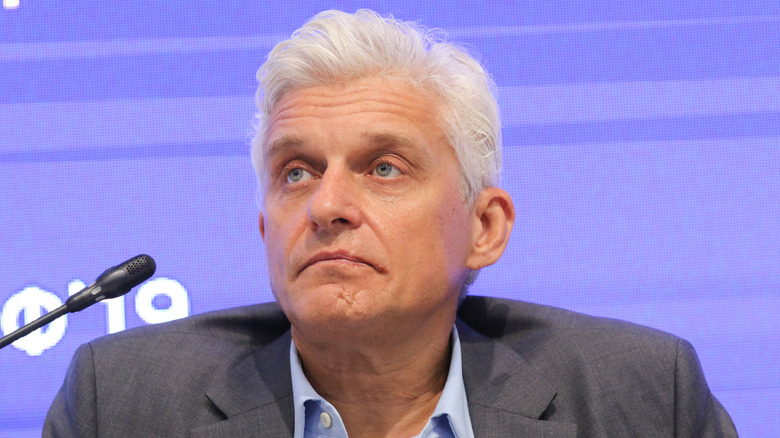5 Oligarchs Who Lost Their Billionaire Fortunes
Anyone who's spent any time online might have seen the word "oligarch" pop up again and again. But because its meaning has gotten diluted and/or muddled, let's clarify: An oligarch is not just a rich person. An oligarch is not even a rich person with sociopolitical influence and sway — that would be all substantially rich people. An oligarch is a wealthy and/or powerful person who intentionally exerts undue influence on a government for selfish, self-enriching ends. And because Russia saw the rise of so many oligarchs following the collapse of the Soviet Union in 1991, Russia gets cited more often than other countries as oligarchical.
But wealth — like health, youth, and beauty — can be fleeting. This is especially true if money is tied to investments, industries that ebb with the whims of markets, or if it's subjected to forces outside of a person's control. And of course, a wealthy person can make dumb decisions like anyone else, and poof: bye bye, money. Sometimes, it's all the above.
Case in point: When the Russo-Ukrainian War broke out in 2022, Russia's oligarchs got hit with sanctions from around the world and lost a collective $95 billion by December 2022. Some regained their money, while others lost it for good. But Russia was a politically turbulent place long before 2022, and this latest round of crestfallen oligarchs is only that: the latest round. Some Russian oligarchs committed legitimate crimes over the years, some were targeted by Vladimir Putin when he came into power, and some remain in debt to this day.
Mikhail Khodorkovsky got tossed in jail
We might as well start with one of the most famous cases of a Russian oligarch who lost (almost) everything. Back in the late 1990s, Mikhail Khodorkovsky was the wealthiest man in Russia. Educated as a chemist, he started with a single café in 1986, expanded his business into multiple markets, and consolidated those into a single privately held banking company, Menatep. In 1995, Menatep's holding company, Rosprom, "won" Yukos, the second largest oil company in Russia, in a corrupt auction. From there, Khodorkovsky set his eyes on Sibneft, another Russian oil company.
Khodorkovsky's ambitious scramble came to an abrupt halt, however, when he crossed Vladimir Putin in 2000. Putin stepped in to halt the growth of power of Khodorkovsky and other oligarchs, which is the correct term when it comes to Khodorkovsky. Menatep grew so quickly because Khodorkovsky ran the accounts for local and state governments. He also joined the Ministry of Fuel and Energy in 1992.
This all came crashing down in 2003 when Khodorkovsky got hit with a series of criminal charges. He'd said "no" to Putin's assertion that wealthy Russians stay out of politics, then was accused of multiple charges of fraud and tax evasion. While in prison, he got hit with embezzlement and money laundering charges. Yukos was forced to pay $50 billion to its shareholders, and Khodorkovsky went from a fortune of $15 billion to $170 million, but, per Quartz he may not even have that much. He was released from prison in 2013 and built a one-man brand for himself centered on Russian political and social commentary, complete with his own website, Khodorkovsky.
Platon Lebedev can't leave Russia
Our second oligarch, Platon Lebedev, is closely related to our first one, Mikhail Khodorkovsky. Lebedev and Khodorkovsky were business partners at Yukos. They were arrested for the same crimes in 2003, tried together, and received the same sentence. While Khodorkovsky was released in 2013, Lebedev stayed in prison until 2014. And while Lebedev didn't have nearly as much money as Khodorkovsky, he still had about $1 billion.
Beyond these basic facts, things get murky. For instance, Amnesty International in 2011 declared both Khodorkovsky and Lebedev to be prisoners of conscience, claiming that they'd been harassed and mistreated over the course of their trial and imprisonment. A year earlier in 2010, The U.K. Parliament denounced Khodorkovsky's and Lebedev's trial as "politically motivated" and cited unfair treatment of the two, like being placed in solitary confinement for no reason. The Khodorkovsky website says that Lebedev was kept in a penal colony for political exiles and only allowed six visits a year. Although, because that site belongs to Khodorkovsky, himself, who shared Lebedev's conviction and calls him a "long-time friend," that information should be taken with a grain of salt.
The last we heard in 2015, Lebedev — unlike Khodorkovsky — wasn't allowed to leave Russia. The Russian government said that he still owed $276 million in taxes, and wouldn't issue him a passport. However, this information comes from the Moscow Times, self-described "independent news from Russia." So, this too should be taken with a grain of salt.
Vladimir Gusinsky ran afoul of Vladimir Putin
Vladimir Gusinsky is another oligarch who ran afoul of Vladimir Putin, but other than that, his similarities to Mikhail Khodorkovsky stop. Gusinsky came from humble beginnings, as a cab driver in the mid-1980s. Unlike many fellow oligarchs, he didn't make his money from oil, mining, steel, or related industries privatized by the Russian government following the collapse of the Soviet Union in 1991. He made money flipping houses, and then in 1993 started Russia's most popular independent media company, NTV. How independent? When Putin came into power in 2000, NTV made fun of him using a big, comical Putin doll. Naturally, Putin didn't like this.
That year, "armed agents in camouflage and ski masks" busted into NTV, claiming that Gusinsky had stolen $10 million, as NPR says. Gusinsky had fled the country for the United States the year before, and a Russian state-controlled gas company, Gazprom, bought NTV. At the time, Gusinsky warned the West that Putin was yet another brutal dictator. Per The Guardian, he said, "Any totalitarian regime must produce fear in the country. He [Putin] must demonstrate to any potential opponent what will happen to him. Business cannot fight him."
Gusinsky never went back to Russia. He lost a lot of money but still had enough to buy a $7 million mansion in Greenwich, Connecticut. He's remained embroiled in a morass of long-distance business dealings across multiple countries since then, and, according to Agents Media, he currently owes more debt than his assets are worth, by about $1.45 million.
Georgy Bedzhamov fled to London
So we come upon Georgy Bedzhamov, former bank owner and member of Putin's "inner circle," who fled Russia like Vladimir Gusinsky before him, per EU Reporter. Bedzhamov's troubles started in 2015 with his sister, Larisa Markus. Markus backdated records related to Bedzhamov's bank, Vneshprombank, to try and withhold assets from the Russian government. She pled guilty to embezzling $1.8 billion in 2017 and received a 9-year prison sentence.
Bedzhamov was long gone by then, though. He fled Russia in 2015 before his sister even got arrested. He hopped from Monaco to London, and as the Organized Crime and Corruption Reporting Project reports, shuffled around funds and tried and hide assets from the Russian government via Cyprus-based law firm, Dadlaw. This information comes from a gargantuan, 12-million document data leak dubbed the "Pandora Papers" obtained by the International Consortium of Investigative Journalists (ICIJ). This leak also shows that Bedzhamov was working with his sister, Markus, the whole time.
Meanwhile, a Moscow Court officially declared Bedzhamov bankrupt in 2018, and then Bedzhamov's former bank, Vneshprombank, froze his assets in 2019. In response, Bedzhamov claimed that the charges against him were politically motivated, and was permitted an allowance of £240,000 a month while living in London, per the Law Gazette. So no, Bedzhamov didn't run out of money, not by a long shot. In 2022, the London High Court also ruled that Bedzhamov could sell some of his property worth £35 million to pay off his debts. At present, Bedzhamov still lives in London as a fugitive with a fraud charge of $1.34 billion on his head in Russia.
Oleg Tinkov got hit with sanctions
And so we come to the most recent Russian oligarch who lost much of his money, Oleg Tinkov. Or at least, the U.K. grouped him with oligarchs when they levied sanctions against him and 106 total Russian individuals following the country's February 2022 invasion of Ukraine. This is true even though Tinkov took to Instagram to explain that he wasn't an oligarch, writing under #i_am_not_an_oligarch (per Coda Story). Either way, Tinkov Bank — Russia's first online-only bank founded in 2006 — lost 90% of its value. In what Tinkov called a "desperate sale, fire sale," per NDTV, Tinkov sold his bank to Vladimir Potanin, prominent oligarch and fifth richest man in Russia.
It was after getting hit with sanctions that Tinkov took to Instagram to say that he didn't consider himself an oligarch. At the time he was recovering from leukemia and in the hospital. By October, 2022, he'd renounced his Russian citizenship and decried the war, saying, "I can't and won't be associated with a fascist country that started a war with their peaceful neighbor and [is] killing innocent people daily."
But even before all this happened, Tinkov had pleaded guilty in 2021 to tax fraud against the United States and paid $500 million. This, plus the devaluation of Tinkov Bank following its sanctions, took Tinkov from $9 billion to less than a billion. But, Tinkov had enough money to move him and his family to Switzerland, where he splits his time between cycling and smoking cigars.
